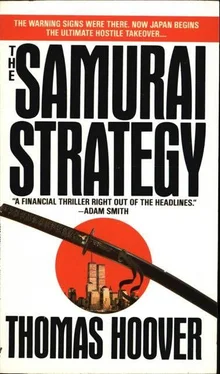Thomas Hoover - The samurai strategy
Здесь есть возможность читать онлайн «Thomas Hoover - The samurai strategy» весь текст электронной книги совершенно бесплатно (целиком полную версию без сокращений). В некоторых случаях можно слушать аудио, скачать через торрент в формате fb2 и присутствует краткое содержание. Жанр: Триллер, на английском языке. Описание произведения, (предисловие) а так же отзывы посетителей доступны на портале библиотеки ЛибКат.
- Название:The samurai strategy
- Автор:
- Жанр:
- Год:неизвестен
- ISBN:нет данных
- Рейтинг книги:5 / 5. Голосов: 1
-
Избранное:Добавить в избранное
- Отзывы:
-
Ваша оценка:
- 100
- 1
- 2
- 3
- 4
- 5
The samurai strategy: краткое содержание, описание и аннотация
Предлагаем к чтению аннотацию, описание, краткое содержание или предисловие (зависит от того, что написал сам автор книги «The samurai strategy»). Если вы не нашли необходимую информацию о книге — напишите в комментариях, мы постараемся отыскать её.
The samurai strategy — читать онлайн бесплатно полную книгу (весь текст) целиком
Ниже представлен текст книги, разбитый по страницам. Система сохранения места последней прочитанной страницы, позволяет с удобством читать онлайн бесплатно книгу «The samurai strategy», без необходимости каждый раз заново искать на чём Вы остановились. Поставьте закладку, и сможете в любой момент перейти на страницу, на которой закончили чтение.
Интервал:
Закладка:
"Right here." She handed it to me.
"Here, Jack, start with this. Just to get up to speed on the background."
He fumbled in his pocket, retrieved his bifocals, and began to read the yellow sheet.
OPERATION MARKETSHARE – 90
Internal Memo No. 22 From: Hiromu Ikeda, Deputy Minister of Industrial Technology Sector, Ministry of International Trade and Industry
(MITI)
Subject: SUPERCHIPS
World dominance in semiconductors will provide the basis for Japan's control of the global information industry by the turn of the century, which will be the key to our economic leadership and military strength. The critical path to achieving this lies with the coming generations of semiconductor technology-the submicron, giga-scale superchip. Accordingly, the objectives of Operation Market- share – 90 in the semiconductor sector should receive the highest possible priority. Areas of research should include semiconductor-grade polysilicon, silicon wafer production, ceramic packaging, quartz photomasks, X-ray lithography, supercooled Josephson junction circuits, and optoelectronic chips for optical switching. R amp;D should also be focused on digital signal processing, application-specific integrated circuits (ASICs), specialized dynamic random access memories (DRAMs), very large-scale integrations (VLSIs) for supercomputers…
"Walton, I can't make heads or tails of this gobbledygook." He tossed down the sheet. "What's this all about?"
"What it means"-Tam spoke up-"is that Ikeda has targeted every emerging area of semiconductor research. Everything. A clean sweep. If he succeeds, sooner or later nobody else will even be able to make the really advanced chips. A few more years and America joins the Third World."
Jack looked a little skeptical. Truthfully I found her extrapolation somewhat fanciful myself. But then, who knew?
"Tam, how about showing Jack that other memo? You know the one."
She didn't say anything, just turned back and sorted through the stack of yellow pages till she had it. Out came Jack's glasses again.
OPERATION MARKETSHARE – 90
Internal Memo No. 37 From: Kenji Asano, Deputy Minister for Research and Planning, Ministry of International Trade and Industry (MITI)
Subject: CURRENT STATUS OF R amp;D
This office has now completed its review of the recent survey of research and development (R amp;D) by Japanese firms compiled by the Science and Technology Agency, the results of which are the subject of this memorandum. Of the companies surveyed, 70% maintain that their research is equal or superior to that of leading firms in the U.S. and Europe, although only 18.2% consider themselves in unchallenged top position. Furthermore, the remaining 30% believe their research is inferior or lagging behind the West (ref. to Table 1). Of those who reported inadequate R amp;D in high technology areas, the following reasons were given…
"Whoever wrote this is just poor-mouthing." He flipped on through the sheets, then looked up. "Saying he needs more money for basic research. I hear this kind of stuff all the time. Hell, Japan already spends nearly twice what we do per capita on nonmilitary R amp;D. What does he want?"
"Keep reading, Jack, and you'll see that the main R amp;D he's pushing is in computers and semiconductors. It ties in exactly with Ikeda's targets. This is backup consensus for the big drive."
"You still haven't told me anything I didn't already suspect." He tossed the pages onto a side table. "So how about answering a few less-obvious questions?" "Shoot."
"First off, what's this Operation Marketshare – 90 all about?" He took off his glasses and pocketed them.
"Jack, remember the famous Hitachi directive that got loose a while back, the one on how to market their 256K memory chips, ordering their salesmen just to keep underpricing American manufacturers till they had the sale, loss no object. According to Henderson, by the time the International Trade Commission got around to convicting them of dumping, they'd demolished America's domestic industry and nailed down ninety percent of the market."
"Ninety, you say. Well, that's getting to be a familiar number." He slumped back against the sofa. "Out of curiosity, what's included in this MITI Marketshare – 90 operation?"
"Computers, of course. But also pretty much everything in high tech where the U.S. still has a leading position-from biotech to aerospace. These guys don't think small."
I gave Ben a pat, then pulled Mori's printout around, going on to explain that we'd come across it in the drawer of her desk. It was, I added, obviously some kind of special computer sorting of the firms DNI was targeting. The categories in the sort were a breakdown of high-tech areas, with individual firms listed underneath, together with a summary of their research expenditures.
"Take a look. First, notice that this printout has been sorted and converted into this list here." I placed it alongside the page I'd found in the Xerox machine. "Voila, they're identical."
"So?"
"Okay, now compare that list with the R amp;D areas targeted in Ikeda's memo." I laid Tarn's translation down next to Mori's pages. "See? Everything on Ikeda's MITI wish list for research in semiconductors is now being done by the American outfits named here in Mori's sorting, which is the latest revision in DNI's acquisition program."
"What are you getting at?" He looked it over.
"It's a pattern." Tam spoke up. "These new buy-ups cover Japan's last remaining shortfalls in R amp;D. I spotted it right away. But what I didn't realize till we got these memos was that the areas covered by Mori's companies exactly dovetail with MITI's goals. I probably wouldn't have noticed it without her sorting. Mixed in with all the other companies Noda's buying, he's targeted those that fill the gaps in MlTI's semiconductor push."
Jack looked at us quizzically. "Are you telling me MITI's behind Noda's program?"
That's where Tam and I parted company. She argued it was obviously a MITI play: why start from scratch when you can just buy what you need? Sound business investment. For some reason, though, I wasn't so sure. Somehow that explanation seemed too simplistic. Unfortunately, however, there's a law in science or somewhere that says you should always pick the least-complicated theory that fits all your data. Hers appeared on the face of it to address the facts perfectly. Except for one unknown: if Mori did "accidentally" feed me the sorting that blew the whistle on Noda's design, why?
"I think this has to be what the buying program on this list is all about," Tam answered. "He's taking over firms whose R amp;D coincides with MITI's targets. Matsuo Noda has been put to work simply acquiring what they need, but to make sure nobody suspects the real agenda, he's worked up this elaborate 'management assistance' story, buying all kinds of companies." Her voice was bitter. "The next step will be to set up joint ventures between these firms he's bought and their counterparts in Japan. Then all American R amp;D would be shared."
"Which means"-Jack's face began to redden-"that since we always seem to lose out when it comes to commercializing what we invent, the U.S. ends up becoming one big think tank for Japan in the twenty-first century. We do the research, and they manufacture and market. They pick our brains and then cash in on it." He turned back to Tam. "Do you really think it was Noda who planned all this?"
"I wish I knew what to think." Her voice grew hesitant as she continued to stare down at the memo. "It's hard to believe Ken would do something so unethical-especially a grab like this-when I'm sure he's convinced Japan ought to be advancing its own R amp;D."
"Ken? Who's-"
"Did you see who authored that second memo?" She pointed to the name.
Читать дальшеИнтервал:
Закладка:
Похожие книги на «The samurai strategy»
Представляем Вашему вниманию похожие книги на «The samurai strategy» списком для выбора. Мы отобрали схожую по названию и смыслу литературу в надежде предоставить читателям больше вариантов отыскать новые, интересные, ещё непрочитанные произведения.
Обсуждение, отзывы о книге «The samurai strategy» и просто собственные мнения читателей. Оставьте ваши комментарии, напишите, что Вы думаете о произведении, его смысле или главных героях. Укажите что конкретно понравилось, а что нет, и почему Вы так считаете.












